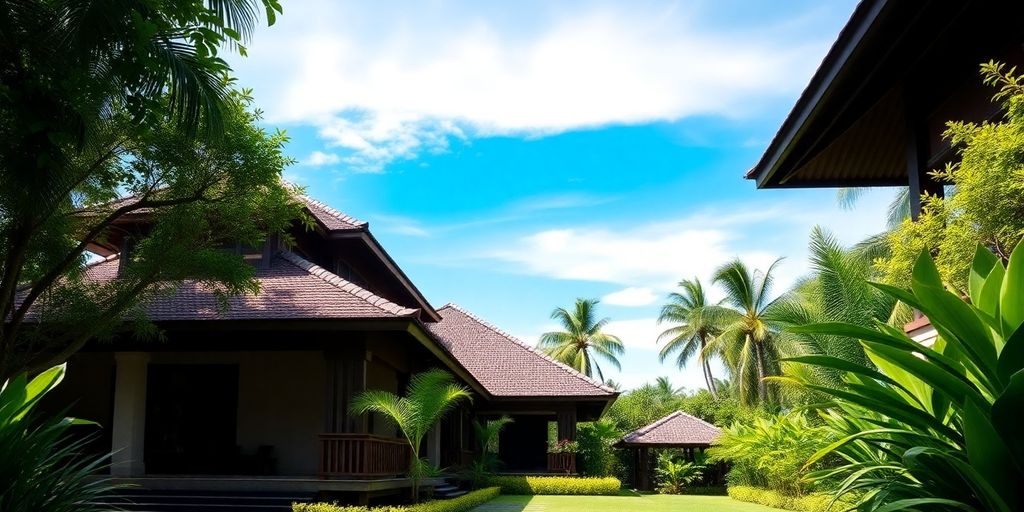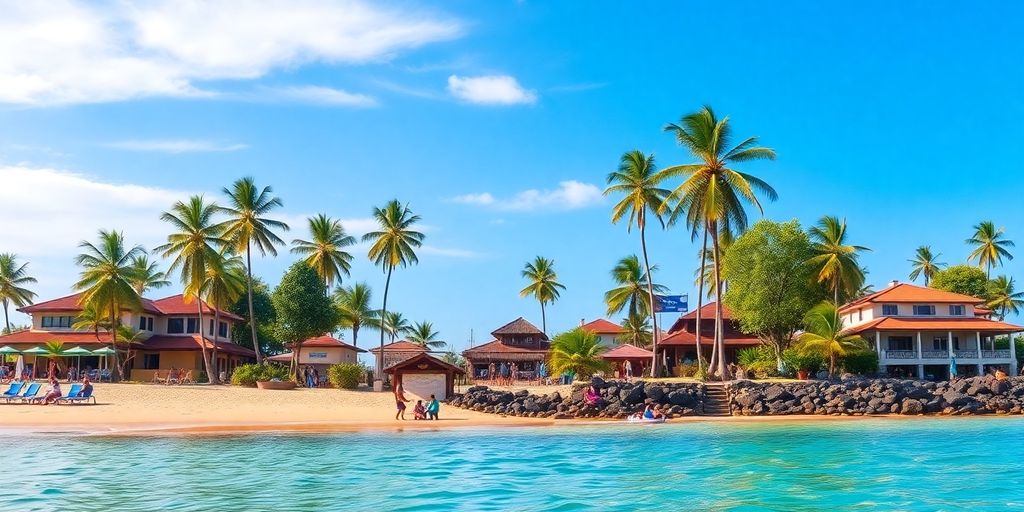Buying in Bali? Use our Guide to Getting a Mortgage in Bali

Thinking about snagging a piece of paradise in Bali? You’re not alone. With its breathtaking views and vibrant culture, Bali is a hot spot for property buyers. But getting a mortgage here? It’s a bit of a maze, especially for foreigners. Whether you’re eyeing a villa or a cozy apartment, understanding the mortgage process is key. This guide breaks down the steps and options for how to get a mortgage in Bali, making your dream home closer than you think.
Key Takeaways
- Foreigners can get mortgages in Bali but face stricter rules and higher down payments.
- Local banks, international lenders, and PMA companies offer different mortgage options.
- Interest rates in Bali are generally higher than in Western countries.
- It’s crucial to understand land ownership laws and the role of PMA companies.
- Alternative financing options like developer installment plans can be more flexible.
Understanding Mortgage Options in Bali

Local Bank Mortgages for Foreigners
If you’re thinking about buying property in Bali, you might be wondering about mortgages. Local banks do offer mortgages to foreigners, but there are a few things to keep in mind. Interest rates tend to be higher than what you might find back home, and banks usually require a hefty down payment, often around 40%. You’ll also need to show proof of a stable income and a solid credit history. The paperwork can be a bit of a hassle, but if you’re planning to stay in Bali long-term, it might be worth it.
International Mortgage Solutions
Another option is to look at international mortgage solutions. Some banks outside of Indonesia offer mortgages for buying property in Bali. The terms can vary a lot depending on where you’re from and which bank you’re dealing with. It’s a good idea to shop around and compare what different banks have to offer. You might find a deal that works better for your situation, especially if you’re not planning to live in Bali full-time.
Financing Through PMA Companies
Lastly, there’s the option of financing through PMA companies, which are basically foreign investment agencies. This can be a good route if you’re looking to use local financial structures to get a loan. It can sometimes offer more flexibility than traditional bank loans, but it’s important to understand the legal and financial implications. Consulting with a financial advisor who knows the ins and outs of Bali’s property market can be really helpful here.
Exploring these mortgage options can open up new possibilities for owning a piece of paradise in Bali. Each route has its own set of pros and cons, so take your time to weigh them carefully.
Navigating the Legal Framework for Mortgages
Land Ownership Laws for Foreigners
Buying property in Bali as a foreigner can be a bit tricky due to land ownership laws. The Indonesian government allows foreigners to own property, but only under specific conditions. The main legal frameworks include the Land Law (UUPA) and Peraturan Menteri Agraria No. 7, 1996. Foreigners can own real estate through schemes like Hak Pakai (Right of Use) and Hak Guna Bangunan (Building Right), but direct ownership of land is restricted. These rights allow you to lease land for a certain period, typically up to 25-30 years, with options for renewal.
Hak Pakai and Hak Guna Bangunan Explained
Hak Pakai, or the Right of Use, is one of the few ways foreigners can legally hold property in Bali. It permits a lease on land for up to 25 years, with the possibility of extending it further. On the other hand, Hak Guna Bangunan, or Building Right, allows you to construct buildings on leased land for up to 30 years. Both rights are pivotal for foreign investors looking to secure a foothold in Bali’s real estate market. It’s crucial to understand these terms and how they impact your property rights.
Role of PMA Companies in Property Ownership
Another route for foreigners to own property in Bali is through a PMA company, which stands for Penanaman Modal Asing or Foreign Investment Company. This method lets you bypass some of the restrictions on direct land ownership. By setting up a PMA, you can technically "own" property through the company. However, this comes with its own set of legal and administrative challenges. Consulting with a legal expert is advisable to navigate these waters effectively.
When buying property in Bali, understanding the legal landscape is essential. While it might seem complex, knowing your options can make the process smoother. Consider seeking advice from professionals who specialize in Indonesian real estate laws to ensure a successful investment.
Steps to Secure a Mortgage in Bali
Researching and Comparing Lenders
First off, dive into the world of lenders. It’s not just about finding any lender, but the right one for you. Start by comparing local banks and international lenders. Each lender will have different terms and conditions, so it’s crucial to understand what each one offers. Make a list of potential lenders and note down their interest rates, loan terms, and any special requirements they might have for foreign buyers.
Preparing Necessary Documentation
Next, get your paperwork in order. This means gathering all the essential documents like your ID, proof of income, tax returns, and any other financial records. Having these ready will speed up the process. Also, if you’re buying a specific property, have the details and valuation reports handy.
Submitting and Awaiting Approval
Once you’ve chosen a lender and have your documents ready, it’s time to submit your application. This step might test your patience as approval can take a while. Remember, the bank will review everything meticulously. They may ask for additional information, so be prepared to provide it quickly to avoid delays.
Securing a mortgage in Bali requires patience and thorough preparation. Make sure to understand each step and stay organized to ease the process.
Key Considerations for Foreign Buyers
Understanding Interest Rates and Terms
When diving into the world of Bali real estate, interest rates are one of the first things to look at. They can vary quite a bit depending on the lender and type of financing you choose. Local banks might offer different rates compared to international lenders. It’s crucial to read the fine print and understand if the rates are fixed or variable. A fixed rate means your monthly payments won’t change, while a variable rate might be lower initially but can increase over time.
Managing Currency Exchange Risks
If you’re buying from abroad, you’re likely dealing with currency exchange. The fluctuations can significantly affect the total cost of your property. Keeping an eye on exchange rates and considering financial instruments like forward contracts can help manage this risk. It’s about balancing the timing of your purchase and the currency conversion to avoid unexpected expenses.
Legal and Administrative Fees
Buying property isn’t just about the price tag on the home. There are a host of legal and administrative fees that can add up. These include notary fees, land title registration, and possibly taxes. It’s wise to budget for these additional costs early on to avoid surprises. Consulting with a local legal expert can provide clarity on what fees to expect.
Buying property in Bali is an exciting venture, but it comes with its own set of challenges. From understanding financial terms to navigating legal requirements, being well-prepared can make the process smoother and more rewarding.
Alternative Financing Options
Exploring ways to finance your dream property in Bali can be quite the adventure. If traditional bank loans aren’t your cup of tea, there are some interesting alternatives to consider.
Developer Installment Plans
One popular option is going through developer financing. This means you get a loan or an installment plan directly from the property developer instead of dealing with a bank. It’s like cutting out the middleman, which can be a relief for many.
- Simplified Process: Fewer hoops to jump through compared to banks.
- Flexible Payment Plans: Developers often let you tailor your payment schedule, whether that’s monthly, quarterly, or annually.
- Lower Initial Costs: Sometimes, you might even get away with a smaller down payment.
- Negotiation Power: There’s room to talk about better terms, like interest rates or payment periods.
But, keep in mind, interest rates might be higher and the repayment periods shorter. Plus, always check the developer’s reputation to avoid any nasty surprises.
Personal Loans for Property Purchase
If you’re not keen on developer plans, personal loans could be your next best bet. These loans are more about your creditworthiness than the property itself. They can be a lifesaver if you need quick cash.
- No Collateral Required: Unlike mortgages, you don’t need to put your property on the line.
- Faster Approval: Generally, these loans are processed quicker than traditional mortgages.
- Flexible Use: You can use the funds for any part of the purchase, including renovations or furnishings.
Just be cautious of the interest rates here too—they can be a bit steep.
Cash Purchases and Their Benefits
Finally, there’s the straightforward route of cash purchases. If you’ve got the funds, this is the simplest way to go. No loans, no interest rates, just a clean transaction.
- Immediate Ownership: No waiting for loan approvals.
- Potential Discounts: Sellers might be more willing to negotiate on price when you’re paying cash.
- Avoiding Debt: You own the property outright, free and clear.
"Paying cash is like buying peace of mind. You skip the debt and own your slice of paradise without any strings attached."
In the end, choosing the right financing option depends on your financial situation and long-term goals. Whether it’s developer plans, personal loans, or cash, each has its perks and pitfalls. Weigh them carefully to make the best decision for your Bali property dream.
Tips for a Successful Property Purchase

Choosing the Right Location
Picking the perfect spot in Bali is kinda like picking your favorite ice cream flavor—it’s all about what suits you best. Do you want to be near the beach, or do you prefer a quieter area with lush greenery? Bali has a mix of bustling tourist spots and serene villages, so think about what vibe you’re going for. Proximity to amenities like shops, schools, and hospitals can also be a big deal, especially if you’re planning to live there long-term.
Working with Real Estate Agents
Finding a reliable real estate agent can make your property hunt much smoother. These folks know the ins and outs of the market and can help you avoid common pitfalls like falling for rental guarantees or skipping legal advice. Make sure to check their credentials and past client reviews. A good agent will guide you through the process, from showing you properties that fit your criteria to helping with the paperwork.
Negotiating Terms and Prices
Don’t be shy when it comes to negotiating. The real estate market in Bali is quite flexible, and you might be able to snag a better deal by haggling a bit. Always ask if there’s room for a discount or if the seller is open to better payment terms. Sometimes, a little back-and-forth can save you a significant chunk of change. Just remember to keep it friendly and professional—no one likes a pushy negotiator.
Buying property in Bali can be a rewarding experience if you take the right steps. From choosing the right location to finding a trustworthy agent, each decision can significantly impact your investment journey. Stay informed and cautious, and you’ll be on your way to owning a slice of paradise.
Post-Purchase Management and Income Generation
Renting Out Your Property
Once you’ve got your hands on a property in Bali, it’s time to think about generating some income. Renting it out is a solid way to do this. You can go the DIY route and manage rentals yourself, or you might want to hire a property management service. These agencies handle everything from finding tenants to dealing with maintenance issues. Choosing the right approach can maximize your rental income and save you a lot of headaches.
Hiring Property Management Services
If you’re not living in Bali full-time or simply don’t want the hassle, property management services are a lifesaver. They handle bookings, cleaning, and maintenance. Plus, they know the local market and can help set competitive rental rates. This way, you can enjoy a steady income without the day-to-day stress.
Maximizing Return on Investment
To really make the most of your investment, consider a few strategies. Keep an eye on the local market trends to adjust your rental rates accordingly. Regular maintenance and upgrades to your property can also boost its appeal and value. And don’t forget about tax obligations; staying compliant is crucial for long-term success. Setting up a PT PMA can help manage your income and ensure you’re on the right side of the law.
Wrapping It Up: Your Path to Owning Property in Bali
So, there you have it. Buying property in Bali isn’t exactly a walk in the park, but it’s definitely doable if you’re up for the challenge. From navigating the ins and outs of local mortgage options to dealing with higher interest rates and hefty down payments, there’s a lot to consider. But hey, if you’re dreaming of owning a slice of paradise, it’s worth the effort, right? Just make sure to do your homework, get the right advice, and be prepared for a bit of paperwork. Before you know it, you could be sipping a coconut on your own Bali property. Good luck on your journey!
Frequently Asked Questions
Can foreigners get a mortgage in Bali?
Yes, foreigners can get a mortgage in Bali, but the process is usually more complicated compared to locals. You’ll need a bigger down payment, proof of income, and meet other requirements.
What are the main types of mortgages available in Bali?
In Bali, you can get a mortgage from local banks, international banks, or through PMA companies. Each option has its own rules and requirements.
How much down payment is needed for a mortgage in Bali?
For foreigners, the down payment is often between 30% to 50% of the property’s value. Local banks usually ask for a higher down payment from non-Indonesian buyers.
What documents are required to apply for a mortgage in Bali?
You’ll need to provide documents like your passport, proof of income, bank statements, and possibly a residency permit or company documents if using a PMA.
Are interest rates higher for foreigners in Bali?
Yes, interest rates for foreigners are typically higher than for locals. It’s important to compare rates from different lenders.
Can I use a property management service in Bali?
Yes, many property owners in Bali use property management services to help rent out their property and handle day-to-day management.








Responses